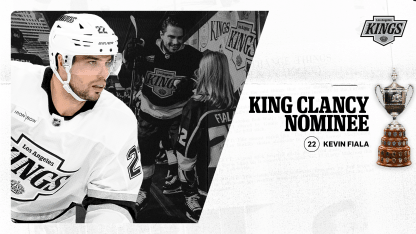LA Kings forward Kevin Fiala has been named as the team’s nominee for the 2025 King Clancy Memorial Trophy. The award is presented annually to the NHL player who “best exemplifies leadership qualities on and off the ice and has made a noteworthy humanitarian contribution to his community.” This marks Fiala’s second consecutive season being chosen as the Kings’ nominee for the prestigious honor.
Throughout his NHL career, the native of St. Gallen, Switzerland, has been a dedicated philanthropist with a particular devotion to children’s causes. Through his “Fiala’s Friends” organization, Fiala hosts patients and families from Children’s Hospital Los Angeles (CHLA) at Kings home games, makes regular visits to the hospital, and organizes youth hockey camps and clinics to help raise money for the Kings Care Foundation and CHLA. In addition to his work with CHLA, Fiala is involved in other charitable causes, including the Make-A-Wish Foundation, Adopt-A-Family, among other team-related initiatives.
Fiala has earned his nomination for the King Clancy Memorial Trophy through his selfless dedication to positively impacting the lives of others throughout Los Angeles. Each of the League’s 32 member clubs will have one player nominated, with the winner being announced at the NHL Awards ceremony in June 2025.
About the King Clancy Memorial Trophy
The King Clancy Memorial Trophy is awarded at the conclusion of each season, with the winner recognized as the NHL player who best demonstrates exemplary leadership qualities has made a significant humanitarian impact on his community. The award is named after King Clancy, a former NHL player and executive who was known for his dedication to charitable work. The award was first given in 1988.
In 1991, Dave Taylor became the first member of the LA Kings to be honored with the King Clancy Memorial Trophy. Taylor was recognized for his efforts in developing the team’s “Tip a King” event to fundraise for the Children’s Cancer Research Fund and for his devotion to helping individuals with speech difficulties after overcoming his own speech impediment.














